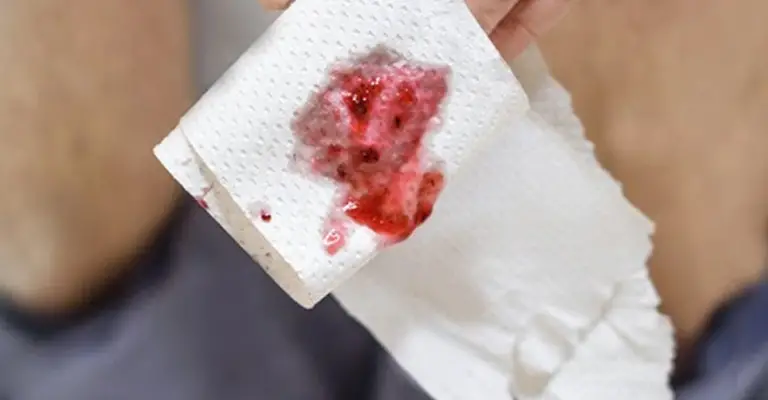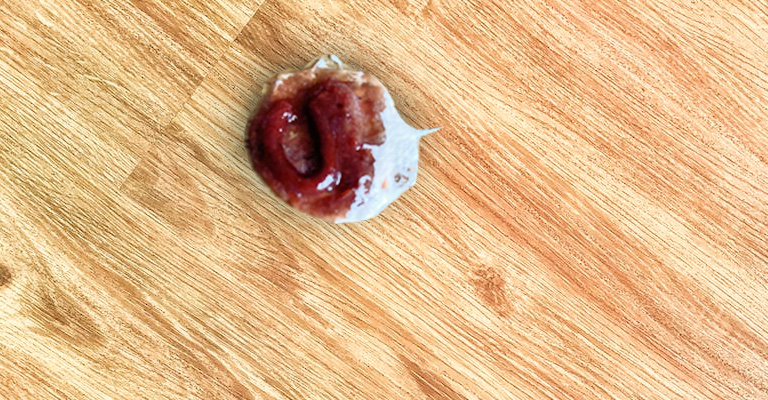Blood in bird poop is a sign of bleeding somewhere in the bird’s digestive tract. It can be caused by various conditions, ranging from mild to severe. Blood in bird poop can indicate a health problem that needs immediate attention and treatment.
In this article, we will explain how to recognize blood in bird poop, the possible causes, how to diagnose the underlying condition, and how to treat it. We will also provide some frequently asked questions and a conclusion.

How to Recognize Blood in Bird Poop
Bird owners must pay close attention to their feathered friends’ droppings as they can provide essential insights into their health. If you notice blood in your bird’s poop, it is crucial to address the issue promptly. Here are some effective ways to recognize blood in bird poop:
Red or Dark Streaks
Blood in bird droppings can appear as red or dark streaks mixed with the standard color of the feces. It may be more noticeable on the surface or within the liquid portion of the droppings.
Discoloration
Blood can cause the poop to have an overall darker or reddish-brown color. This change in coloration is a clear indicator of the presence of blood.
Fresh Blood and Digested Blood
Fresh blood in the droppings appears bright red, while digested blood may appear darker or blackish. Differentiating between fresh and digested blood can provide clues about the location and severity of the bleeding.
Changes in Consistency
Blood in bird droppings can affect the consistency of the poop. It may become more watery, sticky, or have a jelly-like texture due to the presence of blood.
Increased Frequency of Blood
If you consistently observe blood in your bird’s droppings over multiple instances, it may indicate an ongoing issue rather than a one-time occurrence. A veterinarian should address frequent or recurring blood in the poop.
Associated Symptoms
Blood in bird droppings may be accompanied by other noticeable symptoms, such as lethargy, decreased appetite, weight loss, changes in behavior, or abnormal feather appearance. These additional signs can help in determining the underlying cause.
Gastrointestinal Issues
Blood in bird droppings can indicate gastrointestinal problems such as gastric ulcers, intestinal parasites, or infections. These conditions may cause irritation or damage to the digestive tract, resulting in blood in the poop.
Trauma or Injury
In some cases, blood in bird droppings may be caused by trauma or injury, such as a cut or internal injury. Birds may injure themselves while flying, landing, or interacting with objects in their environment.
Blood Clots or Mucus
If you notice clots or mucus-like substances in the bird’s droppings, it may indicate bleeding from the upper respiratory tract, sinuses, or cloaca. These conditions require immediate veterinary attention.
Causes of Blood in Bird Poop

There are many possible causes of blood in bird poop, some of which are:
Foreign Bodies
Birds may ingest foreign objects, such as seeds, toys, metal, plastic, or wood, that can damage their digestive tract and cause bleeding.
Cancer
Birds may develop tumors or cancers in their digestive tract that can bleed and obstruct their normal function.
Bacterial Infections
Birds may contract bacterial infections, such as salmonella, E. coli, or clostridium, that can cause inflammation and ulceration of their digestive tract and cause bleeding.
Parasitic Infections
Birds may get infected by parasites, such as worms, protozoa, or coccidia, that can damage their intestinal lining and cause bleeding.
Toxins
Birds may be exposed to toxins, such as lead, zinc, pesticides, or medications, that can irritate their digestive tract and cause bleeding.
Trauma
Birds may suffer from injuries or accidents that can cause trauma to their digestive tract and cause bleeding.
Stress
Birds may experience stress from various factors, such as changes in environment, diet, routine, or social interactions, affecting their immune system and making them more prone to infections and bleeding.
Diagnosis of Blood in Bird Poop

To diagnose the cause of blood in bird poop, your veterinarian will thoroughly examine your bird and ask you about its history, diet, behavior, and environment. Your veterinarian will also collect a sample of your bird’s poop and perform various tests on it, such as:
Cytology
This is a microscopic examination of the cells and organisms present in the poop sample. It can help identify bacteria, parasites, fungi, yeast, or abnormal cells.
Culture
This test involves growing bacteria or fungi from the poop sample on a particular medium. It can help identify the specific type and strain of infection and its antibiotic sensitivity.
Biochemistry
This test measures the levels of various substances in the poop sample, such as enzymes, proteins, electrolytes, or toxins. It can help assess the function and health of various organs and systems.
Hematology
This test counts and analyzes the different types of blood cells in the poop sample. It can help detect anemia, inflammation, or infection.
Your veterinarian may also perform other tests on your bird, such as:
X-rays
These images use radiation to create a picture of your bird’s internal structures. They can help detect foreign bodies, tumors, or obstructions in your bird’s digestive tract.
Ultrasound
This test uses sound waves to create a picture of your bird’s internal organs. It can help evaluate the size, Shape, and function of your bird’s digestive tract and other organs.
Endoscopy
This procedure involves inserting a thin, flexible tube with a camera and a light at the end into your bird’s mouth or vent. It can help visualize and biopsy your bird’s digestive tract and collect samples for further testing.
Treatment of Blood in Bird Poop
The treatment of blood in bird poop depends on the cause and severity of the condition. Some possible treatments are:
Surgery
This procedure involves removing or repairing the source of bleeding in your bird’s digestive tract, such as a foreign body, tumor, or ulcer. It may require general anesthesia and hospitalization for your bird.
Medication
This treatment involves giving your bird drugs, such as antibiotics, antiparasitics, anti-inflammatories, or painkillers, to treat the infection, inflammation, or pain causing the bleeding. It may require oral, injectable, or topical administration for your bird.
Fluid Therapy
This treatment involves giving your bird fluids, such as water, electrolytes, or blood transfusions, to treat the dehydration, shock, or anemia caused by the bleeding. It may require intravenous, subcutaneous, or oral administration for your bird.
Diet Modification
This treatment involves changing your bird’s diet to suit its condition and needs. It may involve giving your bird bland, soft, or easily digestible foods, such as cooked rice, pasta, or oatmeal, to reduce the irritation and stress on its digestive tract.
It may also involve supplementing your bird’s diet with vitamins, minerals, or probiotics to boost its immune system and digestion.
Environmental Enrichment
This treatment involves improving your bird’s environment to reduce stress and boredom. It may involve providing your bird with a spacious, clean, well-ventilated cage, a variety of perches, toys, enrichment items, a balanced and varied diet, and regular social interaction and exercise.
FAQs
Stress or abrupt dietary changes can cause gastrointestinal disturbances, leading to blood in the droppings. Gradual diet transitions and minimizing stressors can help alleviate this issue.
A single instance of blood in the droppings may not cause immediate alarm, but it is still advisable to monitor your bird closely. If the blood persists or is accompanied by other concerning symptoms, consult a veterinarian.
Blood in bird droppings can indicate various health conditions, ranging from minor to severe diseases. A veterinary evaluation is necessary to determine the underlying cause and appropriate treatment.
Maintaining a balanced diet, providing clean and safe living conditions, and regular veterinary check-ups can help prevent many conditions that may lead to blood in the droppings.
Home treatment is only recommended with a proper diagnosis from a veterinarian. Identifying the underlying cause accurately and administering appropriate treatment under professional guidance is crucial.
Conclusion
Blood in bird poop is a sign of bleeding somewhere in the bird’s digestive tract. It can be caused by various conditions, ranging from mild to severe. Blood in bird poop can indicate a health problem that needs immediate attention and treatment.
To prevent blood in bird poop, you must take good care of your bird and its environment. You must also monitor its poop regularly and report any changes or abnormalities to your veterinarian.
If you notice blood in your bird’s poop, you should contact your veterinarian as soon as possible. Your veterinarian will perform a thorough examination and various tests to diagnose the cause of the bleeding. Your veterinarian will also prescribe the appropriate treatment for your bird, depending on the cause and severity of the condition.
By understanding how to recognize, diagnose, and treat blood in bird poop, you can better care for your feathered friend and enjoy a stronger bond.